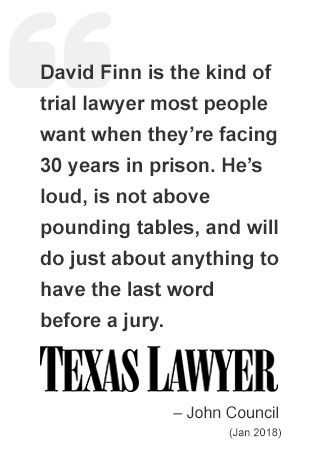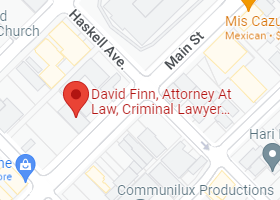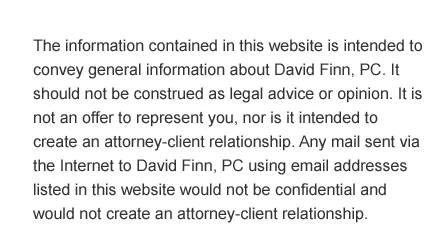


Sealing Juvenile Records in Texas
Juvenile Criminal Record in Texas
Sealing of Juvenile Records-Overview
Texas Family Code Section 58.003 provides for the sealing of juvenile records. An individual with juvenile records available for sealing may file an application for sealing of records in a juvenile court of the county in which the proceeding occurred. Juvenile records ordered sealed by the court are removed from the criminal history database. Individuals attempting to seal juvenile records should seek the advice of a licensed attorney, such as David Finn, to determine if they are eligible for an order sealing records.
Texas Family code Section 58.203 restricts access to certain juvenile records. Records relating to an individual’s juvenile case that meet the criteria established by Section 58.203 are certified by the Department for automatic restriction of access.
Who has a Juvenile File and Record In Texas?
If you have been arrested, taken into custody or charged with a criminal offense (Class A or B misdemeanor or any felony) that was committed when you were at least 10 years old but younger than 17 years old, you probably have a juvenile file and record. You may also have a juvenile record if you were charged with some Class C misdemeanor offenses if the justice or municipal court transferred your case to a juvenile court.
What are Juvenile Justice Files and Records?
Under the record keeping system for juvenile records in Texas, if a juvenile was adjudicated for delinquent conduct (Class A or B misdemeanor or any felony), the juvenile probably has a juvenile record with numerous entities including local law enforcement, the Texas Department of Public Safety (DPS) and the Federal Bureau of Investigation (FBI). That record is a permanent record that is not destroyed or erased unless the record is eligible for sealing and the child or the child’s family hires a lawyer to file a petition in court to have the record sealed.
Who usually has Access to Juvenile Records?
While juvenile files and records are generally confidential, there are some important exceptions. A juvenile record can be accessed by police, sheriff’s officers, prosecutors, probation officers, correctional officers, and other criminal and juvenile justice officials in this state and elsewhere. Also, the record may be available to employers, educational institutions, licensing agencies, and other organizations when the person applies for employment or educational programs. Juvenile treatment records (counseling, placement, drug treatment, etc.) are confidential and accessible only to authorized users.
What is the Automatic Restriction of Access to Records System?
In Texas there now exists a records system that is designed to limit access to your juvenile records after you reach 21 years of age if you do not commit criminal offenses after becoming 17 years of age. The system is called Automatic Restriction of Access to Records. This is in addition to your opportunity to have your records sealed and destroyed under other provisions of the Texas Family Code.
Under automatic restriction of access to records, your records are not destroyed or sealed. They remain in place, but under restricted access. They are available only to criminal justice agencies for criminal justices purposes, such as investigating and prosecuting crimes. For all other inquiries, employment, education, etc. the holder of the records is required to reply that the records not exist and you are legally allowed to deny that you were ever arrested, prosecuted or adjudicated for a crime
How does a Juvenile’s Records become eligible for Restricted Access?
For restricted access to take place, no action is required by the child or the child’s family. You do not have to file a petition or hire a lawyer. The process occurs automatically at age 21 if, since your 17th birthday, you have not
Committed a felony or a Class A or B misdemeanor; or
Received deferred adjudication for or been convicted in adult court of a Class A or B misdemeanor or a felony.
If you meet the requirements set out above you will be given a fresh start when you reach age 21. This allows you to pursue various employment and educational opportunities without your past record in the juvenile system to harm you.
But remember, this opportunity will only happen if you do not commit any criminal offenses. If you commit a crime after turning 21, your records will be removed from restricted access.
What does it mean if records are placed on Restricted Access?
If a juvenile’s record is placed on restricted access when the respondent becomes 21 years of age, access to the record will be denied to employers, educational institutions, and other persons who may want the information. Only criminal justice agencies will have access to these records and only for a criminal justice purpose, which include investigation of crimes and for the screening persons who apply for employment in a criminal justice agency (police officers, etc.)
What records are not eligible for Restricted Access?
The only juvenile records that are not eligible for automatic restricted access are cases that were:
Handled as determinate sentence cases by the juvenile court;
Certified (transferred) to adult criminal court to be handled in the same manner as adult cases; or
Prosecuted in justice or municipal court.
What about Gang Records?
Information about gang activity is maintained by DPS in gang book records as authorized by law. These records are exempt from the new system because the access to these records is already limited to criminal justice agencies for a criminal justice purpose.
What about Sex Offender Records?
Sex offender registration records are exempted from the Restricted Access system because the purpose of registration is to notify the public. If you are a registered juvenile sex offender, you may have a right to have your records sealed once your obligation to register expires. Also, there are other legal proceedings that may allow reconsideration of your obligation to register. Talk to your probation or parole officer about these, or speak to a private attorney.
How does the Restricted Access records system benefit my child?
If a juvenile’s records are placed on restricted access, the juvenile may:
Deny the existence of the juvenile record; and
Deny the arrest, prosecution or adjudication ever happened.
For example, once your juvenile records are on restricted access, you may legally answer in the negative when a job application, educational or occupational licensing application asks, you ever been arrested, convicted or adjudicated of a crime?
It is important to understand that if you commit a crime after turning age 17 and you are convicted of or placed on deferred adjudication for the offense in adult criminal court, your records are not eligible for Restricted Access. You do not have the right to deny the existence of your juvenile record. If you deny in this situation, you could be prosecuted for perjury (failing to tell the truth).
If you commit a crime after turning 21, your records will be removed from restricted access. You would then also lose your right to deny the existence of your juvenile record.
What should I do to make sure my records are placed on Restricted Access?
To be sure your records are eligible for and placed on restricted access you must:
Successfully complete your period of probation or parole with no violations; and
Commit no criminal offense after becoming 17 years of age
The Restricted Access system truly gives juveniles the opportunity for rehabilitation and a fresh start if they do not commit any further criminal offenses.
When did this new system take effect?
The new law went into effect September 1, 2001. It applies to all juvenile records created before, on or after September 1, 2001.
Should I still try to get my records sealed or destroyed?
The sealing and destruction of juvenile records procedures do offer some additional benefits to a juvenile and may be the preferred course of action. To have your record sealed, you must initiate a formal court proceeding and may need an attorney. Also, if you have criminal records in a justice or municipal court, special expungement procedures apply. If you have questions about any of these procedures, discuss them with your attorney or your probation or parole officer.
Texas Family Code Sec. 58.003. SEALING OF RECORDS.
(a) Except as provided by Subsections (b) and (c), on the application of a person who has been found to have engaged in delinquent conduct or conduct indicating a need for supervision, or a person taken into custody to determine whether the person engaged in delinquent conduct or conduct indicating a need for supervision, on the juvenile court’s own motion the court shall order the sealing of the records in the case if the court finds that:
(1) two years have elapsed since final discharge of the person or since the last official action in the person’s case if there was no adjudication; and
(2) since the time specified in Subdivision (1), the person has not been convicted of a felony or a misdemeanor involving moral turpitude or found to have engaged in delinquent conduct or conduct indicating a need for supervision and no proceeding is pending seeking conviction or adjudication.
(b) A court may not order the sealing of the records of a person who has received a determinate sentence for engaging in delinquent conduct that violated a penal law listed in Section 53.045 or engaging in habitual felony conduct as described by Section 51.031.
(c) Subject to Subsection (b), a court may order the sealing of records concerning a person adjudicated as having engaged in delinquent conduct that violated a penal law of the grade of felony only if:
(1) the person is 21 years of age or older;
(2) the person was not transferred by a juvenile court under Section 54.02 to a criminal court for prosecution;
(3) the records have not been used as evidence in the punishment phase of a criminal proceeding under Section 3(a), Article 37.07, Code of Criminal Procedure; and
(4) the person has not been convicted of a penal law of the grade of felony after becoming age 17.
(d) The court may grant the relief authorized in Subsection (a) at any time after final discharge of the person or after the last official action in the case if there was no adjudication. If the child is referred to the juvenile court for conduct constituting any offense and at the adjudication hearing the child is found to be not guilty of each offense alleged, the court shall immediately order the sealing of all files and records relating to the case.
(e) Reasonable notice of the hearing shall be given to:
(1) the person who made the application or who is the subject of the records named in the motion;
(2) the prosecuting attorney for the juvenile court;
(3) the authority granting the discharge if the final discharge was from an institution or from parole;
(4) the public or private agency or institution having custody of records named in the application or motion; and
(5) the law enforcement agency having custody of files or records named in the application or motion.
(f) A copy of the sealing order shall be sent to each agency or official named in the order.
(g) On entry of the order:
(1) all law enforcement, prosecuting attorney, clerk of court, and juvenile court records ordered sealed shall be sent before the 61st day after the date the order is received to the court issuing the order;
(2) all records of a public or private agency or institution ordered sealed shall be sent before the 61st day after the date the order is received to the court issuing the order;
(3) all index references to the records ordered sealed shall be deleted before the 61st day after the date the order is received, and verification of the deletion shall be sent before the 61st day after the date of the deletion to the court issuing the order;
(4) the juvenile court, clerk of court, prosecuting attorney, public or private agency or institution, and law enforcement officers and agencies shall properly reply that no record exists with respect to the person on inquiry in any matter; and
(5) the adjudication shall be vacated and the proceeding dismissed and treated for all purposes other than a subsequent capital prosecution, including the purpose of showing a prior finding of delinquent conduct, as if it had never occurred.
(g-1) Any records collected or maintained by the Texas Juvenile Probation Commission, including statistical data submitted under Section 141.044, Human Resources Code, are not subject to a sealing order issued under this section.
(h) Inspection of the sealed records may be permitted by an order of the juvenile court on the petition of the person who is the subject of the records and only by those persons named in the order.
(i) On the final discharge of a child or on the last official action in the case if there is no adjudication, the child shall be given a written explanation of the child’s rights under this section and a copy of the provisions of this section.
(j) A person whose records have been sealed under this section is not required in any proceeding or in any application for employment, information, or licensing to state that the person has been the subject of a proceeding under this title and any statement that the person has never been found to be a delinquent child shall never be held against the person in any criminal or civil proceeding.
(k) A prosecuting attorney may, on application to the juvenile court, reopen at any time the files and records of a person adjudicated as having engaged in delinquent conduct that violated a penal law of the grade of felony sealed by the court under this section for the purposes of Sections 12.42(a)-(c) and (e), Penal Code.
(l) On the motion of a person in whose name records are kept or on the court’s own motion, the court may order the destruction of records that have been sealed under this section if:
(1) the records relate to conduct that did not violate a penal law of the grade of felony or a misdemeanor punishable by confinement in jail;
(2) five years have elapsed since the person’s 16th birthday; and
(3) the person has not been convicted of a felony.
(m) On request of the Department of Public Safety, a juvenile court shall reopen and allow the department to inspect the files and records of the juvenile court relating to an applicant for a license to carry a concealed handgun under Subchapter H, Chapter 411, Government Code.
(n) A record created or maintained under Chapter 62, Code of Criminal Procedure, may not be sealed under this section if the person who is the subject of the record has a continuing obligation to register under that chapter.
(o) An agency or official named in the order that cannot seal the records because the information required in the order under Subsection (p) is incorrect or insufficient shall notify the court issuing the order before the 61st day after the date the agency or official receives the order. The court shall notify the person who made the application or who is the subject of the records named in the motion, or the attorney for that person, before the 61st day after the date the court receives the notice that the agency or official cannot seal the records because there is incorrect or insufficient information in the order.
(p) A person who is eligible to seal records may file an application for the sealing of records in a juvenile court of the county in which the proceedings occurred. The application and sealing order entered on the application must include the following information or an explanation for why one or more of the following is not included:
(1) the applicant’s:
(A) full name;
(B) sex;
(C) race or ethnicity;
(D) date of birth;
(E) driver’s license or identification card number; and
(F) social security number;
(2) the offense charged against the applicant or for which the applicant was referred to the juvenile justice system;
(3) the date on which and the county where the offense was alleged to have been committed; and
(4) if a petition was filed in the juvenile court, the cause number assigned to the petition and the court and county in which the petition was filed.
Added by Acts 1995, 74th Leg., ch. 262, Sec. 53, eff. Jan. 1, 1996. Amended by Acts 1997, 75th Leg., ch. 165, Sec. 10.05(a), eff. Sept. 1, 1997; Acts 1997, 75th Leg., ch. 1086, Sec. 18, eff. Sept. 1, 1997; Acts 1999, 76th Leg., ch. 62, Sec. 19.01(20), eff. Sept. 1, 1999; Acts 1999, 76th Leg., ch. 147, Sec. 1, eff. Sept. 1, 1999; Acts 2003, 78th Leg., ch. 283, Sec. 26, eff. Sept. 1, 2003; Acts 2005, 79th Leg., ch. 949, Sec. 16, eff. Sept. 1, 2005.
For more information on this subject, please contact Dallas criminal defense lawyer David Finn, at (214) 651.1121, or email Mr. Finn at: judgefinn@davidfinn.com
David Finn
Phone Numbers
Office: (214) 538-6629







